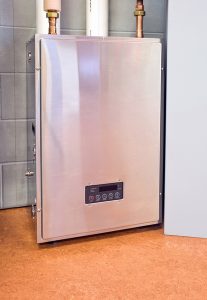 A few weeks ago, we wrote a “for” and “against” article for the heat pump water heater. If we’re going to do that, then we have to follow up at some point with the tankless water heater and provide the same set of arguments.
A few weeks ago, we wrote a “for” and “against” article for the heat pump water heater. If we’re going to do that, then we have to follow up at some point with the tankless water heater and provide the same set of arguments.
Tankless water heaters are popular options for water heater replacements, and they’re only going to become more popular as homeowners discover their numerous advantages. But as with any type of water heater, there’s no “one size fits all” answer. A tankless water heater may be unsuitable for your home’s water usage or your budget.
The following “for” and “against” may help you start to narrow down your choice. But when it comes to making the final decision, please always work with a professional who understands tankless water heaters in Cleves, OH.
The Case For
- Energy savings: Tankless water heaters are also called “on demand” water heaters because they only heat water when there is demand for it; i.e., when a hot water tap comes on in the house demanding hot water. Unlike a storage tank water heater, which loses heat from the tank continually and must keep using energy to heat it up again, a tankless system only works when needed. You can expect to pay much less for your hot water when you use a tankless system.
- No running out of hot water: Another benefit of a system that will always heat up water as you need it is that you won’t run out of hot water. There’s no tank storing water that can be depleted!
- Small size: A tankless water heater doesn’t take up much space at all since there’s no need for it to store water. A tankless water heater can be mounted on a wall, and you’ll have some valuable storage space back.
- Longevity: Because a tankless water heater undergoes much less strain over time than a tank water heater, it will last longer on average—giving you more time to accrue savings.
The Case Against
- Higher installation cost: The upfront cost to install a new tankless water heater is more than a conventional storage tank system. It will pay back its installation in a few years thanks to its energy-saving performance, but it may not fit in with your current budget requirements.
- Too much demand can overwhelm it: Although the tankless water heater will keep heating up more water, too many taps on at the same time can cause it to be overwhelmed and lose efficiency. For some households, this might be a problem.
- Hot water delay: Because the tankless systems work on-demand, it takes longer for hot water to reach the taps once they’re turned on compared to a tankless system.
- They have trouble with hard water: Hard water is bad for any water heater, but the effects of hard water will negatively affect a tankless system quicker as the sediment builds up in its lines.
What’s the final tally when it comes to your house and your hot water needs? Our experts are here to help you find out—and they’ll install the new system, whatever one you decide on.
